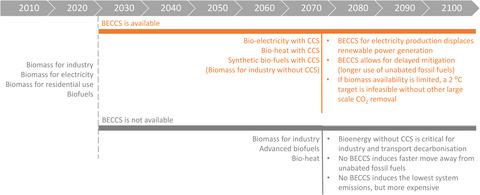当前位置:
X-MOL 学术
›
GCB Bioenergy
›
论文详情
Our official English website, www.x-mol.net, welcomes your
feedback! (Note: you will need to create a separate account there.)
The role of bioenergy for global deep decarbonization: CO2 removal or low‐carbon energy?
Global Change Biology Bioenergy ( IF 5.9 ) Pub Date : 2020-01-30 , DOI: 10.1111/gcbb.12666 Isabela Butnar 1 , Oliver Broad 1 , Baltazar Solano Rodriguez 1 , Paul E. Dodds 1
Global Change Biology Bioenergy ( IF 5.9 ) Pub Date : 2020-01-30 , DOI: 10.1111/gcbb.12666 Isabela Butnar 1 , Oliver Broad 1 , Baltazar Solano Rodriguez 1 , Paul E. Dodds 1
Affiliation

|
Bioenergy is expected to have a prominent role in limiting global greenhouse emissions to meet the climate change target of the Paris Agreement. Many studies identify negative emissions from bioenergy generation with carbon capture and storage (BECCS) as its key contribution, but assume that no other CO2 removal technologies are available. We use a global integrated assessment model, TIAM‐UCL, to investigate the role of bioenergy within the global energy system when direct air capture and afforestation are available as cost‐competitive alternatives to BECCS. We find that the presence of other CO2 removal technologies does not reduce the pressure on biomass resources but changes the use of bioenergy for climate mitigation. While we confirm that when available BECCS offers cheaper decarbonization pathways, we also find that its use delays the phase‐out of unabated fossil fuels in industry and transport. Furthermore, it displaces renewable electricity generation, potentially increasing the likelihood of missing the Paris Agreement target. We found that the most cost‐effective solution is to invest in a basket of CO2 removal technologies. However, if these technologies rely on CCS, then urgent action is required to ramp up the necessary infrastructure. We conclude that a sustainable biomass supply is critical for decarbonizing the global energy system. Since only a few world regions carry the burden of producing the biomass resource and store CO2 in geological storage, adequate international collaboration, policies and standards will be needed to realize this resource while avoiding undesired land‐use change.
中文翻译:

生物能源在全球深度脱碳中的作用:去除二氧化碳还是低碳能源?
生物能源有望在限制全球温室气体排放以实现《巴黎协定》的气候变化目标方面发挥重要作用。许多研究确定了以碳捕集与封存(BECCS)为主要贡献的生物能源发电产生的负排放,但假设没有其他可用的CO 2去除技术。当直接空气捕获和植树造林成为BECCS的具有成本竞争力的替代品时,我们使用全球综合评估模型TIAM-UCL来研究生物能源在全球能源系统中的作用。我们发现其他CO 2的存在去除技术不会减轻生物质资源的压力,但会改变生物能源在缓解气候变化方面的使用。尽管我们确认,只要有可用的BECCS提供更便宜的脱碳途径,我们还发现,使用BECCS会延迟工业和运输中未减缓的化石燃料的淘汰。此外,它取代了可再生能源发电,有可能增加错过《巴黎协定》目标的可能性。我们发现,最具成本效益的解决方案是投资一篮子CO 2清除技术。但是,如果这些技术依赖CCS,则需要采取紧急措施来扩大必要的基础架构。我们得出结论,可持续的生物质供应对于使全球能源系统脱碳至关重要。由于只有少数几个世界区域承担着生产生物质资源并将CO 2储存在地质存储中的重担,因此需要充分的国际合作,政策和标准来实现这一资源,同时避免不必要的土地用途变化。
更新日期:2020-01-30
中文翻译:

生物能源在全球深度脱碳中的作用:去除二氧化碳还是低碳能源?
生物能源有望在限制全球温室气体排放以实现《巴黎协定》的气候变化目标方面发挥重要作用。许多研究确定了以碳捕集与封存(BECCS)为主要贡献的生物能源发电产生的负排放,但假设没有其他可用的CO 2去除技术。当直接空气捕获和植树造林成为BECCS的具有成本竞争力的替代品时,我们使用全球综合评估模型TIAM-UCL来研究生物能源在全球能源系统中的作用。我们发现其他CO 2的存在去除技术不会减轻生物质资源的压力,但会改变生物能源在缓解气候变化方面的使用。尽管我们确认,只要有可用的BECCS提供更便宜的脱碳途径,我们还发现,使用BECCS会延迟工业和运输中未减缓的化石燃料的淘汰。此外,它取代了可再生能源发电,有可能增加错过《巴黎协定》目标的可能性。我们发现,最具成本效益的解决方案是投资一篮子CO 2清除技术。但是,如果这些技术依赖CCS,则需要采取紧急措施来扩大必要的基础架构。我们得出结论,可持续的生物质供应对于使全球能源系统脱碳至关重要。由于只有少数几个世界区域承担着生产生物质资源并将CO 2储存在地质存储中的重担,因此需要充分的国际合作,政策和标准来实现这一资源,同时避免不必要的土地用途变化。











































 京公网安备 11010802027423号
京公网安备 11010802027423号